 |
|
| Issue #71 • September/October, 2001 |
First couple days of June, 1998, weather pretty good, a bit wetter than it is now. Clear day, clouds moving in during the afternoon. By suppertime, the sky was darkly overcast and a southwest wind drove hard cold rain ahead of it. The flock of Jacob sheep, white fleece speckled with black spots, crowded into the old barn, always knowledgeable about these things. If the hardy heirloom breed was concerned enough to leave the spring-thick pasture grass, then there was reason for us to be concerned, as well.
Nick and I did as we always do, when signs show the rough Ozarks hills are in for a blow: we walked the perimeter of the house and barns, looking for anything that could go wronga loose board to turn into a lethal kite, a piece of metal roofing tin beginning to bang itself free, livestock packing foolishly into corners to escape the howling wind. Soaked and saturated, we plodded around the buildings. The old two-story white farmhouse still looked solid and tightly packed, in spite of the peeling paint and rusting roof. It has held together through a century of storms, and we trust it to hold together through the one that’s coming, as well.
Around the west side of the house, I see the heads of herb plants, waving and bending in the wind, barely marking the corners of my beloved herb garden. The plants will probably lose a layer of leaves, but should come through okay. Here’s a young yellow hen, her head poked underneath an old tree root, thinking she’s hiding from the coming stormwe grab her, squawking and complaining, and tuck her under a coat sleeve until we can get her back to the barn. There’s a lamb, standing forlorn and wetly droopy under a spreading old field oak, separated from the flockwe walk out into the storm’s face, eating rain, to herd the bleating youngster back to her mam. Even the dogs have taken to their homes; not a one of them is willing to venture out to accompany us on this soggy ritual.
I cast a nervous eye at the propane tank, a mere 30 feet from the house. It is my secret fear that this tank will attract lightning some day, and blow our hilltop clean of buildings and life. I hardly even looked at the old red oak, a 100-foot tall sentinel in our front yard. Like our farmhouse, this massive tree has stood relentless through centuries of storms, ancient enough to have been planted by the hand of George Washingtonhad that worthy ever visited the Ozarks.
On the protected north-facing front porch, Nick and I skin off our rain slickers and wriggle out of water-logged boots. There’s no point in taking these inside to create puddles there; we’ll just leave them out here, hanging on coathooks, for when we survey the storm’s aftermath in a couple hours. At least, that’s what we thought.
Inside, the house still retains some of the day’s usual warmth. We close the south-facing windows, trying to keep the battering rain from soaking any more of the flooring than it already has. Distant rumbles and closer intermittent flashes let us know that it is also time to unplug: appliances, computer, video, radios, everything that could be fried by a random jolt of current. Unplugging is our son’s job, his acknowledged pre-storm work since he was barely a toddler….he’s now 16. At the same time, with the tension borne of previous weather-encounters, our daughter puts a half-dozen flashlights and an equal number of emergency candles on the coffee table in the living room, and checks the rechargeable batteries just to be sure. She also clears a path to the steps leading to the storm cellar under the pantry. Up to this time, we have never used it to shelter from severe weather. In spite of her mounting anxiety, we won’t use it tonight, either. To use it, you see, is to admit that there is some real danger about.
|
Like typical storms in the Ozarks, the front comes in fast and furious. “Gully washer” is how old timers have referred to this weather. Trees offer up their leaves and their branches to the high winds, small unsuspecting animals are swept willy nilly into suddenly-violent creeks, rivers overwash their borders and haul large game fish downstream to newly scooped pools, ponds refill, and the grass gets another growth spurt. From start to finish, sometimes less than an hour elapses.
It is generally an hour in which you know, with the clarity that comes from pure visceral terror, that you are alive.
The storm begins to pound our house, rain crashing in heavy sheets against the walls, windows, metal roofenough, at times, to nearly drown conversation. We’ve already abandoned the battery-radio…storm-static makes it unlistenable. The electric power, true to form, flickers and goes out. Now, we sit together, the four of us in one room, silent amid the din outdoors, and pretend to be absorbed in books or thoughtsnot one of us willing to acknowledge our essential physical impotence before nature’s violent power. As if by some unstated agreement, we act as though we can still the storm, by imagining it awayif we don’t look at its fury, perhaps it really isn’t there.
Suddenly, a new sound roars over the wind and raina rattling pelting against the south and west windows, loud and strong enough to threaten breaking the glass. Hail! Large stones, this time, like the big aggies kids use for marbles.
Now we are on our feet, flashlights in hand like ritual totems, protection from the mounting dark, from the anger of the storm. I head to the bathroom window, the one with the clearest south view. All I can see is the white shroud of hail. All I can hear is the bang of it hitting the wall, inches away from me. I begin to think that visiting the storm cellar might be a good idea, then cast the thought from me. I would not think about the cellar again this night.
The curtain of hail breaks for a moment. The sight from my bathroom window is nearly beyond descriptionrain, hail, mixed and flying right and left simultaneously; the leafy branches of a young silver maple a dozen feet away making wide, hard circles; everything elsebarns, pasture, woods, animalslost in the green-grey shimmering light beyond. And the wind, not howling anymore, but hissing and sighing.
The white shroud closes; the abrupt bang of hail startles me back a step.
“The tree’s down!” A shocked voice from the front of the house, one of the kids.
I move as if in a dream, that perceived slow underwater motion that belies the adrenaline flow that powers it. In the dining room, facing east, the window is completely obscuredleaves blacken all outside storm-light.
“What happened?”
“It’s just a branch!”
“It’s the oak!”
“The creeper vine fell off the wall!”
“No, it’s one of the little poplars!”
Confusion. Disbelief…this isn’t happening, can’t be happening. How could the tree have fallen this way? The wind would have blown it toward the north, away from the house! The oak would crush our home, destroy the entire upper floor, tear the walls down to the ground if it fell.
“Check upstairs! See if any branches are poking through!” The kids dash up the steps, return in momentsno damage visible, no wet spots. Only leaves, blocking their windows, too.
“What kind of leaves?”
“Oak,” the boy says.
“I told you we should have gone to the storm cellar,” the girl says.
We all turn back to the leaf-collaged window, the sense of awe arising unbiddennot even a pane of glass is damaged, not even a single hairline crack. Is that possible? No one had even heard the fallno crunch of trunk snapping, no rending or tearing of bark or limbs. Just a rushing sound, a swishing noise, then a window full of leaves.
Minutes that seem like hours pass, and so does the brunt of the storm. On the front porch, shielded from the trailing rain squalls, Nick and I stare without comprehension: the giant old red oak is down. But, it’s not merely toppledit looks as though a giant hand has grasped it, given it a full three-quarter turn, then dropped it carefully next to the house. It has literally brushed the west side of our home with its leaves. That’s all.
Of course, it’s also utterly buried my entire herb garden, squashed our propane tank two feet deep into the damp earth, and left a gaping rootball-hole three feet in depth and ten feet across in the front yard.
But we are alive, unharmed, and too surprised to be afraid. That came later.
The ancient Celts believed that an oak in the door yard provided protection for the home. Certainly, the acorns could have fed pigs, cattle, and hungry residentsand the fallen old branch wood, used sparingly and carefully, could have made tools or warmed the hearth. This old red oak had been our protection for the preceding 12 years. Our first storm, a month after we moved in, the oak took a bolt of lightning, spraying bark and branchwood around the yardit was the highest point on our hill; the next highest was our house. We felt that the ancient protection of oaks had been there for us.
The great, spreading, canopy of leaves kept the house significantly cooler than outside temperatures during the heat of summer, and gave the grass a respite from the glare of mid-summer sun. The children built a swing on one of the lower branches. It took another strike during our 9th year. Once, in a dream, I felt myself become a part of the old tree, looked out over the jagged wooded hills through leaf-green eyes, and felt terribly alone: all the other ancient oaks were gone.
So, our thirteenth year dawned. A storm passed through, as it had done for two centuries of the tree’s life. This time, the wind moved in a tornadic circle, plucked the old red oak from the ground, and let it go.
What strange motives move the forces of a storm? A few inches to one side, and branches as thick around as a burly man’s torso would have been driven into our beds, into our kitchen, into our unresisting bodies.
Instead, the old oak protected us again, one last timeit’s final action to spare our home from the disaster that could have been.


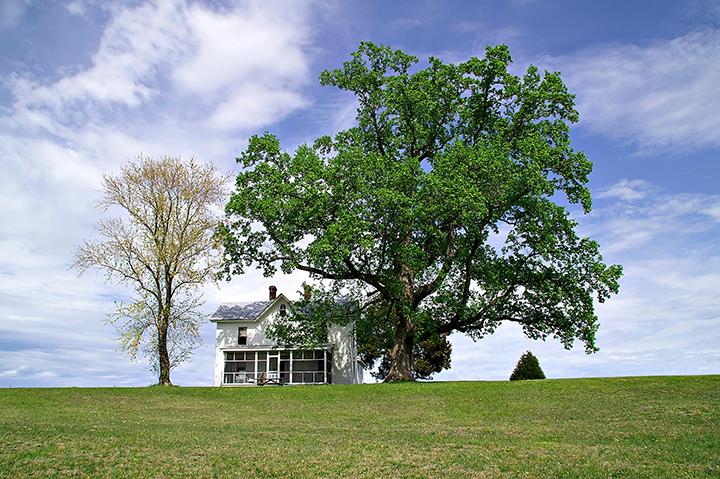

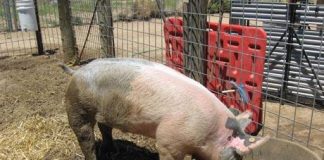





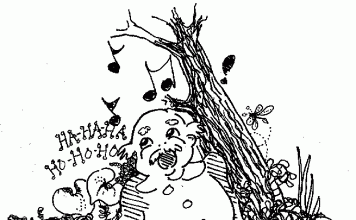
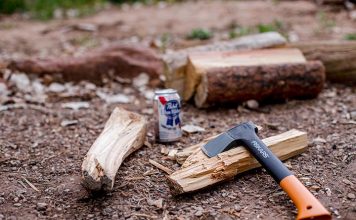



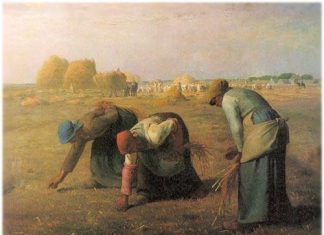
I enjoyed your telling of your experience. We live about an hour’s drive from the Ozarks and go there in Autumn to enjoy the foliage. As a retired rural electric linesman, we were some of the first out in those storms. Many times, those ancient tree’s fall, afterwards leave not only an empty space in the yard or field but in us as well. I liked your story, it made me remember how my wife had to hunker down with just herself and two small children while I was out troubleshooting/ repairing storm damage on powerlines. Thank you for sharing this.